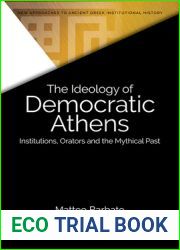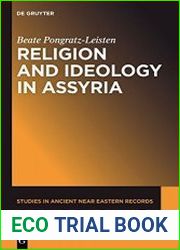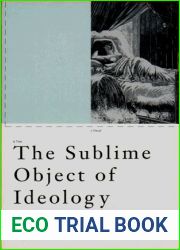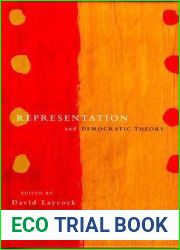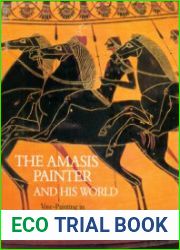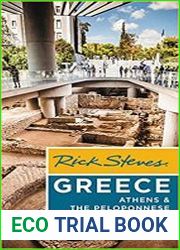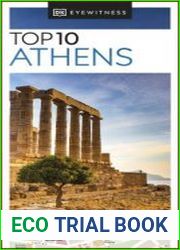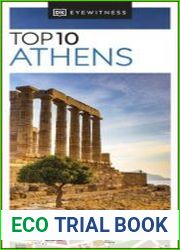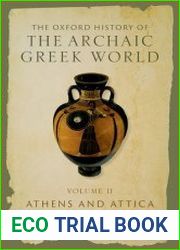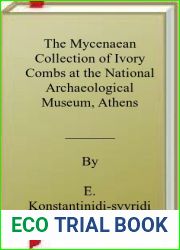
BOOKS - The Ideology of Democratic Athens: Institutions, Orators and the Mythical Pas...

The Ideology of Democratic Athens: Institutions, Orators and the Mythical Past (New Approaches to Ancient Greek Institutional History)
Author: Matteo Barbato
Year: June 1, 2020
Format: PDF
File size: PDF 3.8 MB
Language: English

Year: June 1, 2020
Format: PDF
File size: PDF 3.8 MB
Language: English

The Ideology of Democratic Athens Institutions Orators and the Mythical Past: New Approaches to Ancient Greek Institutional History In "The Ideology of Democratic Athens Institutions Orators and the Mythical Past Matteo Barbato offers a fresh perspective on the construction of democratic ideology in Classical Athens, challenging the traditional polarized viewpoints that have long dominated the debate. By examining four myths through the lens of New Institutionalism, Barbato reveals a fluid and dynamic set of ideas, values, and beliefs that were shared by the Athenians, shaped by the institutions of their democracy. This approach highlights the active participation of both the masses and the elite in the creation and evolution of these ideas, allowing for multiple and compatible interpretations of the community and its mythical past. Barbato's study begins by investigating the social memory of Athens' mythical past, recognizing the significance of these stories in shaping the city's collective identity. He then delves into the debate surrounding Athenian democratic ideology, which has historically been divided between two extremes: a Marxist tradition that views ideology as a cover-up for internal divisions, and a culturalist interpretation that sees it as a fixed set of ideas shared by the community. Barbato's unitary approach seeks to bridge this dichotomy, demonstrating how the Athenians' constant ideological practice influenced by their democratic institutions gave rise to a diverse range of ideas and values.
Идеология демократических афинских институтов Ораторы и мифическое прошлое: новые подходы к древнегреческой институциональной истории В «Идеологии демократических афинских институтов Ораторы и мифическое прошлое» Маттео Барбато предлагает новый взгляд на построение демократической идеологии в классических Афинах, бросая вызов традиционным поляризованным точкам зрения, которые имеют долгое время доминировал в дебатах. Исследуя четыре мифа через призму нового институционализма, Барбато раскрывает изменчивый и динамичный набор идей, ценностей и убеждений, которые разделяли афиняне, сформированные институтами их демократии. Этот подход подчеркивает активное участие как масс, так и элиты в создании и эволюции этих идей, позволяя множественным и совместимым интерпретациям сообщества и его мифического прошлого. Исследование Барбато начинается с исследования социальной памяти мифического прошлого Афин, признавая значение этих историй в формировании коллективной идентичности города. Затем он углубляется в дебаты вокруг афинской демократической идеологии, которая исторически была разделена между двумя крайностями: марксистской традицией, которая рассматривает идеологию как сокрытие внутренних разногласий, и культуралистской интерпретацией, которая рассматривает ее как фиксированный набор идей, разделяемых сообществом. Унитарный подход Барбато стремится преодолеть эту дихотомию, демонстрируя, как постоянная идеологическая практика афинян под влиянием их демократических институтов породила разнообразный спектр идей и ценностей.
Idéologie des institutions démocratiques athéniennes s orateurs et le passé mythique : nouvelles approches de l'histoire institutionnelle grecque antique Dans « Idéologie des institutions démocratiques athéniennes s orateurs et le passé mythique », Matteo Barbato propose une nouvelle vision de la construction de l'idéologie démocratique dans les Athènes classiques, défiant les points de vue traditionnels polarisés qui ont longtemps dominé le débat. En explorant les quatre mythes à travers le prisme du nouvel institutionnalisme, Barbato révèle un ensemble variable et dynamique d'idées, de valeurs et de croyances qui ont divisé les Athéniens formés par les institutions de leur démocratie. Cette approche souligne la participation active des masses et des élites à la création et à l'évolution de ces idées, permettant des interprétations multiples et compatibles de la communauté et de son passé mythique. L'étude de Barbato commence par une étude de la mémoire sociale du passé mythique d'Athènes, reconnaissant l'importance de ces histoires dans la formation de l'identité collective de la ville. Il s'enfonce ensuite dans le débat autour de l'idéologie démocratique athénienne, historiquement divisée entre deux extrêmes : la tradition marxiste, qui considère l'idéologie comme une dissimulation des divisions internes, et l'interprétation culturaliste, qui la considère comme un ensemble fixe d'idées partagées par la communauté. L'approche unitaire de Barbato cherche à surmonter cette dichotomie en montrant comment la pratique idéologique permanente des Athéniens, influencée par leurs institutions démocratiques, a donné naissance à un large éventail d'idées et de valeurs.
Ideología de las instituciones democráticas atenienses Oradores y pasado mítico: nuevos enfoques de la historia institucional griega antigua En «Ideologías de las instituciones democráticas atenienses Oradores y pasado mítico», Matteo Barbato ofrece una nueva visión de la construcción de una ideología democrática en la Atenas clásica, desafiando los puntos de vista polarizados tradicionales que tienen mucho tiempo atrás dominó el debate. Explorando los cuatro mitos a través del prisma del nuevo institucionalismo, Barbato revela el conjunto volátil y dinámico de ideas, valores y creencias que compartían los atenienses formados por las instituciones de su democracia. Este enfoque enfatiza la participación activa tanto de las masas como de las élites en la creación y evolución de estas ideas, permitiendo interpretaciones plurales y compatibles de la comunidad y su pasado mítico. estudio de Barbato comienza con un estudio de la memoria social del mítico pasado de Atenas, reconociendo la importancia de estas historias en la formación de la identidad colectiva de la ciudad. Luego se profundiza en el debate en torno a la ideología democrática ateniense, que históricamente se ha dividido entre dos extremos: la tradición marxista, que ve la ideología como un encubrimiento de las divisiones internas, y la interpretación culturalista, que la ve como un conjunto fijo de ideas compartidas por la comunidad. enfoque unitario de Barbato busca superar esta dicotomía, demostrando cómo la constante práctica ideológica de los atenienses, influenciada por sus instituciones democráticas, ha generado una variada gama de ideas y valores.
Ideologia das instituições democráticas de Atenas Oradores e passado mítico: novas abordagens para a história institucional grega antiga Em «As ideologias das instituições democráticas de Atenas Oradores e o passado mítico», Matteo Barbato oferece uma nova visão sobre a construção de uma ideologia democrática em Atenas clássica, desafiando os tradicionais pontos de vista polarizados que têm dominado o debate durante muito tempo. Ao explorar os quatro mitos através do prisma do novo institucionalismo, Barbato revela um conjunto volátil e dinâmico de ideias, valores e crenças que os atenienses partilhavam das instituições de sua democracia. Esta abordagem enfatiza a participação ativa das massas e das elites na criação e evolução dessas ideias, permitindo interpretações múltiplas e compatíveis da comunidade e de seu passado mítico. O estudo de Barbato começa com uma pesquisa sobre a memória social do passado mítico de Atenas, reconhecendo a importância dessas histórias na formação da identidade coletiva da cidade. Depois, aprofundou-se no debate sobre a ideologia democrática de Atenas, que historicamente foi dividida entre dois extremos: a tradição marxista, que vê a ideologia como uma dissimulação de diferenças internas, e a interpretação culturalista, que a vê como um conjunto fixo de ideias compartilhadas pela comunidade. A abordagem unitária de Barbato busca superar esta dicotomia, demonstrando como a prática ideológica constante dos atenienses, influenciada por suas instituições democráticas, gerou uma variedade de ideias e valores.
Ideologie demokratischer athenischer Institutionen Redner und mythische Vergangenheit: Neue Ansätze zur antiken griechischen Institutionsgeschichte In „Ideologien demokratischer athenischer Institutionen Redner und mythische Vergangenheit“ bietet Matteo Barbato eine neue Perspektive auf die Konstruktion demokratischer Ideologie im klassischen Athen und fordert die traditionellen polarisierten Standpunkte heraus, die die Debatte seit langem beherrschen. Durch die Untersuchung der vier Mythen durch die Linse des neuen Institutionalismus enthüllt Barbato die volatile und dynamische Reihe von Ideen, Werten und Überzeugungen, die die Athener teilten, geprägt von den Institutionen ihrer Demokratie. Dieser Ansatz unterstreicht die aktive Beteiligung sowohl der Massen als auch der Elite an der Schaffung und Entwicklung dieser Ideen, indem er vielfältige und kompatible Interpretationen der Gemeinschaft und ihrer mythischen Vergangenheit ermöglicht. Barbathos Forschung beginnt mit der Erforschung des sozialen Gedächtnisses der mythischen Vergangenheit Athens und erkennt die Bedeutung dieser Geschichten für die Bildung der kollektiven Identität der Stadt an. Dann taucht er in die Debatte um die athenische demokratische Ideologie ein, die historisch zwischen zwei Extremen geteilt wurde: der marxistischen Tradition, die Ideologie als Vertuschung innerer Differenzen betrachtet, und der kulturalistischen Interpretation, die sie als eine feste Reihe von Ideen betrachtet, die von der Gemeinschaft geteilt werden. Barbathos einheitlicher Ansatz versucht, diese Dichotomie zu überwinden, indem er zeigt, wie die ständige ideologische Praxis der Athener unter dem Einfluss ihrer demokratischen Institutionen ein vielfältiges Spektrum an Ideen und Werten hervorgebracht hat.
Ideologia demokratycznych ateńskich instytucji oratorów i mitycznej przeszłości: Nowe podejścia do starożytnej greckiej historii instytucjonalnej w „Ideologie demokratycznych ateńskich instytucji oratorów i mitycznej przeszłości”, Matteo Barbato oferuje nową perspektywę na budowę ideologii demokratycznej w klasycznych Atenach, kwestionującej tradycyjne spolaryzowane poglądy, które od dawna zdominowały debatę. Odkrywając cztery mity poprzez soczewkę nowego instytucjonalizmu, Barbato ujawnia płynny i dynamiczny zbiór idei, wartości i przekonań, które Ateńczycy, ukształtowani przez instytucje swojej demokracji, podzielali. Podejście to podkreśla aktywny udział zarówno mas, jak i elity w tworzeniu i ewolucji tych idei, umożliwiając wielokrotne i kompatybilne interpretacje społeczności i jej mitycznej przeszłości. Badania Barbato zaczynają się od zbadania pamięci społecznej mitycznej przeszłości Aten, uznając znaczenie tych historii w kształtowaniu zbiorowej tożsamości miasta. Następnie zagłębia się w debatę wokół ateńskiej ideologii demokratycznej, która historycznie została podzielona między dwie skrajności: marksistowską tradycję, która postrzega ideologię jako zatuszowanie wewnętrznych podziałów, oraz kulturystyczną interpretację, która postrzega ją jako stały zbiór idei podzielanych przez wspólnotę. Jednomyślne podejście Barbato zmierza do przezwyciężenia tej dychotomii, pokazując, w jaki sposób nieustanna praktyka ideologiczna Ateńczyków pod wpływem ich demokratycznych instytucji wytworzyła różnorodny wachlarz idei i wartości.
''
Demokratik Atina Kurumları Hatipleri İdeolojisi ve Mitolojik Geçmiş: "Demokratik Atina Kurumları Hatipleri ve Mitolojik Geçmiş İdeolojileri'nde Antik Yunan Kurumsal Tarihine Yeni Yaklaşımlar, Matteo Barbato, klasik Atina'da demokratik ideolojinin inşasına yeni bir bakış açısı sunuyor ve uzun zamandır egemen olan geleneksel kutuplaşmış bakış açılarına meydan okuyor münazara. Dört efsaneyi yeni bir kurumsallık merceğinden inceleyen Barbato, demokrasilerinin kurumları tarafından şekillendirilen Atinalıların paylaştığı akıcı ve dinamik fikir, değer ve inanç kümesini ortaya koyuyor. Bu yaklaşım, hem kitlelerin hem de seçkinlerin bu fikirlerin yaratılışına ve evrimine aktif katılımını vurgulayarak, topluluğun ve efsanevi geçmişinin çok sayıda ve uyumlu yorumuna izin verir. Barbato'nun araştırması, Atina'nın efsanevi geçmişinin toplumsal hafızasını inceleyerek başlar ve bu hikayelerin kentin kolektif kimliğini şekillendirmedeki önemini kabul eder. Daha sonra, tarihsel olarak iki aşırı uç arasında bölünmüş olan Atina demokratik ideolojisi etrafındaki tartışmaya girer: Ideolojiyi iç bölünmelerin örtbas edilmesi olarak gören Marksist gelenek ve onu topluluk tarafından paylaşılan sabit bir fikir kümesi olarak gören kültürcü yorum. Barbato'nun üniter yaklaşımı, Atinalıların demokratik kurumlarının etkisi altındaki sürekli ideolojik pratiğinin nasıl çeşitli fikirler ve değerler ürettiğini göstererek bu ikilemin üstesinden gelmeyi amaçlamaktadır.
أيديولوجيا خطباء المؤسسات الأثينية الديمقراطية والماضي الأسطوري: مناهج جديدة للتاريخ المؤسسي اليوناني القديم في «أيديولوجيات خطباء المؤسسات الأثينية الديمقراطية والماضي الأسطوري»، يقدم ماتيو بارباتو منظورًا جديدًا لبناء الأيديولوجية الديمقراطية في أثينا الكلاسيكية، تحدي وجهات النظر التقليدية المستقطبة التي سيطرت على النقاش لفترة طويلة. من خلال استكشاف أربع أساطير من خلال عدسة مؤسسية جديدة، يكشف بارباتو عن مجموعة مرنة وديناميكية من الأفكار والقيم والمعتقدات التي يشاركها الأثينيون، الذين شكلتهم مؤسسات ديمقراطيتهم. يؤكد هذا النهج على المشاركة النشطة لكل من الجماهير والنخبة في ابتكار وتطور هذه الأفكار، مما يسمح بتفسيرات متعددة ومتوافقة للمجتمع وماضيه الأسطوري. يبدأ بحث بارباتو بفحص الذاكرة الاجتماعية لماضي أثينا الأسطوري، مع إدراك أهمية هذه القصص في تشكيل الهوية الجماعية للمدينة. ثم يتعمق في الجدل حول الأيديولوجية الديمقراطية الأثينية، والتي تم تقسيمها تاريخيًا بين طرفين: التقليد الماركسي، الذي يرى الأيديولوجية على أنها تغطية للانقسامات الداخلية، والتفسير الثقافي، الذي يعتبرها مجموعة ثابتة من الأفكار المشتركة من قبل المجتمع. يسعى نهج بارباتو الوحدوي إلى التغلب على هذا الانقسام من خلال إظهار كيف أن الممارسة الأيديولوجية المستمرة للأثينيين تحت تأثير مؤسساتهم الديمقراطية قد ولدت مجموعة متنوعة من الأفكار والقيم.







